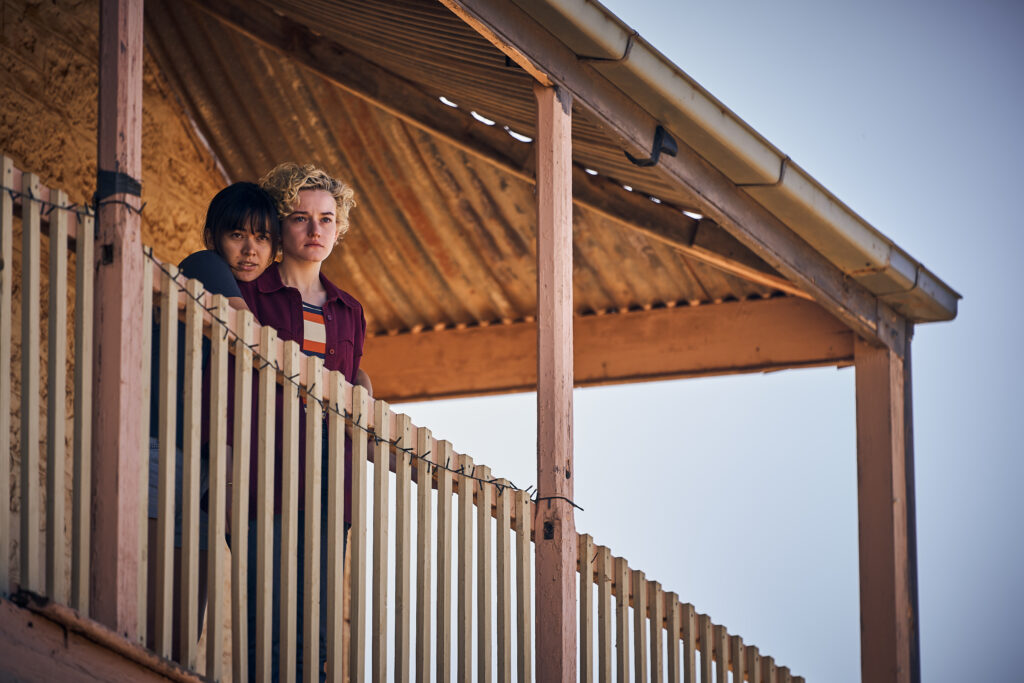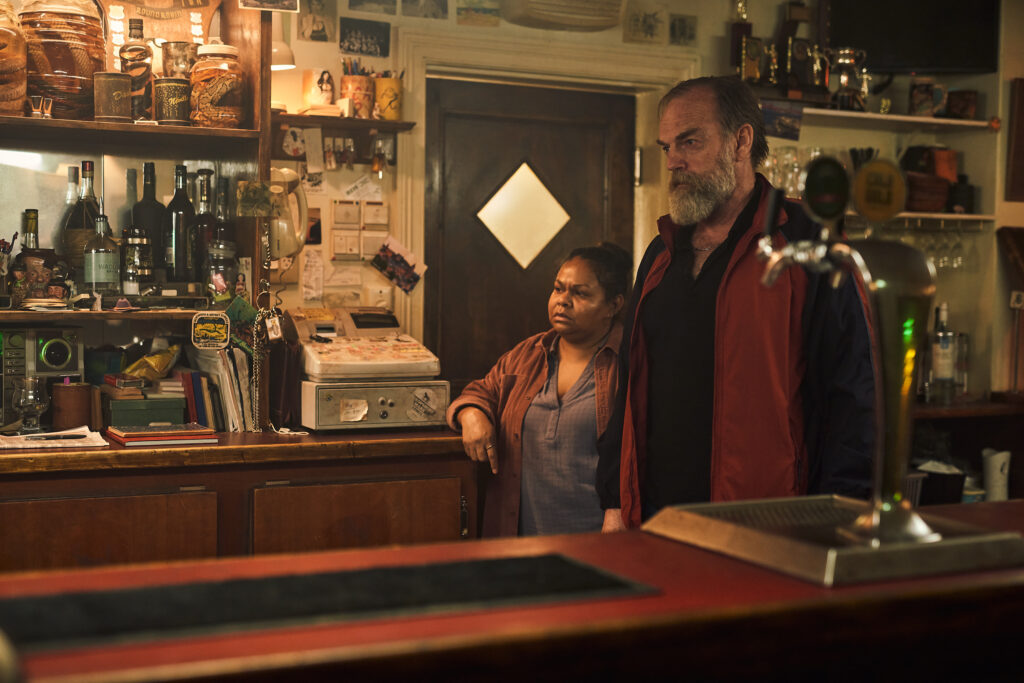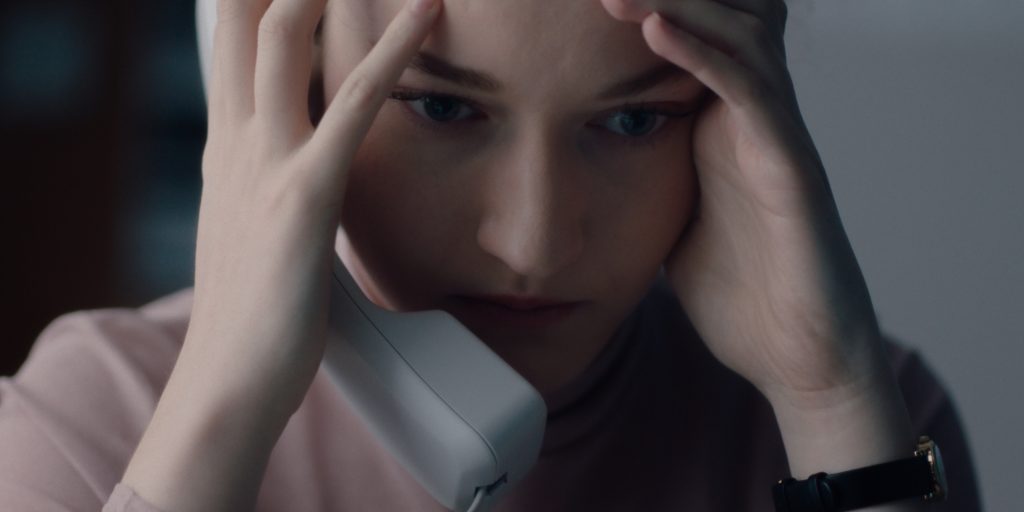September 20, 2023
by Carla Hay

Directed by Kitty Green
Culture Representation: Taking place in South Australia, the dramatic film “The Royal Hotel” features a predominantly white cast of characters (with a few Aboriginal people and one Asian) portraying the working-class and middle-class.
Culture Clash: Two young female tourists from Canada take a live-in bartending job at a shabby and sordid pub in a remote, male-dominated mining town, and they experience various levels of danger and harassment.
Culture Audience: “The Royal Hotel” will appeal primarily to people who are fans of star Julia Garner and movies about subtle and not-so-subtle sexual tensions and power-based dynamics between men and women.

“The Royal Hotel” is a realistic observation of how two female friends can have very different reactions to being in the same male-dominated environment. Despite a few story flaws, the movie accurately shows how people try to dismiss harassment as “joking.” “The Royal Hotel” had its world premiere at the 2023 Telluride Film Festival and its Canadian premiere at the 2023 Toronto International Film Festival.
Written and directed by Kitty Green, “The Royal Hotel” touches on many of the same themes that are in Green’s 2020 film “The Assistant.” Both movies are about how women navigate in an enviroment where men have almost all of the power, and most of the men in that environment abuse that power through misogynistic harassment or violence. Julia Garner stars in both movies.
“The Assistant” is based partially on real-life experiences of administrative assistants of Harvey Weinstein, the disgraced entertainment mogul who became a convicted and imprisoned rapist. “The Royal Hotel” is also inspired by real events: The movie is based on the 2017 Australian documentary “Hotel Coolgardie,” which is about two young Scandanavian women who became trapped in a remote mining town in Australia.
That’s what happens to Canadian tourists Hanna (played by Garner) and Liv (played by Jessica Henwick), who are best friends leading a nomadic existence. Hanna (the responsible and cautious friend) and Liv (the free-spirited and spontaneous friend) aren’t really on vacation, but they don’t have any immediate plans to go back to Canada. They both like to party, but Hanna doesn’t drink alcohol. It’s later revealed that Hanna’s mother abused alcohol when Hanna was a child.
In the beginning of the movie, Hanna and Liv are partying at a nightclub somewhere in Australia when Liv discovers (after her credit card is declined) that they have run out of money. Hanna and Liv are in a work/travel program that helps people find temporary jobs in places where they are visiting. It’s never made clear in the movie how long Hanna and Liv have been living this way.
At an office appointment, an unnamed woman (played by Bree Bai), who works for this program, informs Liv and Hanna that the only immediate job opening available is a bartending gig at a pub in a converted hotel in a remote mining town in Australia. This office worker tells Liv and Hanna that the job, which includes free lodging for the pub employees, involves a lot of “male attention,” because most of the people who live in this area are men. The office employee describes the job as something that attracts a lot of young women. She tries to make it sound like it would be adventurous to work there.
From the beginning, Hanna feels uneasy about this job offer and is reluctant to take the job because she thinks it might be dangerous. Liv doesn’t have any of those concerns and asks out of curiosity about this remote location: “Will there be kangaroos?” Because they are desperate for money, Hanna and Liv accept this job offer. It’s a decision that they will later regret.
Because Hanna and Liv can’t afford to have their own car in their current circumstances, the pub’s manager Carol (played by Ursula Yovich) gives a car ride to Hanna and Liv to this unnamed, desolate town in South Australia. (“The Royal Hotel” was filmed on location in South Australia.) At first, Carol has a gruff and unfriendly attitude toward the two pals. The pub is located in a shabby place that used to be known as the Royal Hotel. Hanna and Liv plan to live and work there for only a few weeks to make enough money to go back to their carefree lifestyle of partying while traveling.
Hanna and Liv will be replacing two other young women: Jules (played by Alex Malone) and Cassie (played by Kate Cheel), who are close friends and originally from Great Britain. Jules and Cassie are “party girls” too, but Jules is more talkative and more extroverted than Cassie. Hanna and Liv first meet Jules and Cassie in the living room of the messy suite area where Hanna and Liv will be staying. Cassie and Jules are startled out of a drunken stupor when Hanna and Liv arrive. Jules laughs when Hanna and Liv ask if this place has WiFi, because there is no WiFi service in this area. Cell phone service is also spotty and rare.
During the course of the movie, Hanna and Liv are targets of hostile sexism from men who are used to getting away with it. However, Hanna and Liv react differently. Hanna thinks it’s offensive and often isn’t afraid to say so. Liv makes excuses and says it’s just part of the “culture” where they are. “The Royal Hotel” has many examples of how women can often be unwitting or deliberate allies and enablers to sexists who want to treat women as inferior to men, thereby helping perpetuate this vicious cycle.
The warning signs about this awful job are obvious from the beginning, when Hanna and Liv first meet Billy (played by Hugo Weaving), the disheveled owner of this struggling business. The shower that Hanna and Liv have to use isn’t working properly, so Billy (who is in his 60s) angrily storms into the room to fix it, and he strikes up a conversation with his two new employees. During this conversation, Hanna mentions that she can speak some Spanish and Portuguese. In response, Billy calls Hanna a “smart cunt,” in a tone of voice that makes it clear that he thinks Hanna is being uppity. Hanna is so shocked by this insult from her new boss, she doesn’t say anything to him about it.
Hanna and Liv know nothing about bartending, so Billy has to train them. Hanna figures out very quickly that she and Liv (and the other young female employees before them) were only hired to be objectified by horny male customers. Liv knows it too, but she doesn’t seem to care, because she thinks they can have a good time anyway. Liv often scolds Hanna for being too “uptight” over the increasingly alarming and hostile actions that the two women get from some of the customers. Liv convinces Hanna to stay just a few weeks so they can make enough money to go to Australia’s Bondi Beach.
The pub’s customers consist mostly of men in their 20s, 30s and 40s. The vast majority of them work in a nearby mine. One of the rare women in the pub is a regular customer named Glenda (played by Barbara Lowing), who is about the same age as Billy. Glenda, who is often drunk, craves attention from the men in the pub, where the atmosphere (not surprisingly) is often rowdy and vulgar. Glenda has an outdated and harmful attitude that men should be allowed to get away with sexual harassment just because they’re men.
On the last night before Cassie and Jess leave the area, they both get very drunk and dance on the pub’s countertop, much to the delight of the male customers. At one point, Cassie and Jess (who are both wearing skirts) lift up their clothes to flash their naked private parts on their upper and lower bodies. The two women don’t want to be groped in their private parts and have to fight off the men who try to commit this sexual assault, which is excused as “drunken antics.” Liv smirks when she quips to a horrified Hanna: “That will be us in a few weeks.”
One of the young male customers named Matty (played by Toby Wallace) plays a prank on Liv by telling her that he wants a drink called Dickens Cider. Liv says she’s never heard of that drink. It takes Liv (who’s not as street smart as she thinks she is) a few minutes to figure out that Dickens Cider is not a real drink but a pun for “dick inside her.” Liv laughs off the joke, while Hanna doesn’t think it’s so funny.
It soon becomes apparent that Matty is attracted to Hanna. In an effort to impress Hanna (who rebuffs his advances), Matty eventually says he’s sorry for his crude prank. Matty can see that Hanna is repulsed by a lot of what she sees in the pub, so he quickly switches gears and tries to give the impression that he’s the “nice guy” in the group. Meanwhile, another young customer named Teeth (played by James Frecheville), who is often teased by the men for being socially awkward, develops a crush on Liv.
And in a sleazy place like this pub, there’s always at least one creep who gives the impression that he’s just one drink away from committing rape. In this pub, this cretin is Dolly (played by Daniel Henshall), a hate-filled loner who likes to bully and harass people for no reason. Dolly will get no sympathy from “The Royal Hotel” viewers when they see what he does.
It would be very easy for any outside observer to say, “Why don’t Hanna and Liv just leave?” It’s not that simple. Hanna and Liv have no money and no means of transportation (the nearest public transportation is too far away to walk), so unless they can find someone in this land of strangers to drive them out of this hellish place for free, they’re out of luck. Carol won’t help because she needs Hanna and Liv to stay as bartenders for the pub.
All Hanna and Liv have to do is get paid and then use the money to leave, right? Wrong. After a while, Hanna and Liv find out that Billy is an alcoholic who hasn’t been paying anyone to whom he owes money. A local vendor named Tommy (played by Baykali Ganambarr), who delivers food and drinks to the pub, hasn’t been paid by Billy for the past three months. Billy owes Tommy $4,300. And eventually, Hanna and Liv see that Billy has no intention of paying them either.
Billy isn’t doing anything to help his failing business. There’s a scene where the phone rings in the nearly empty pub. Billy picks up the phone, and without even finding out who’s calling and why, he rudely shouts, “We’re busy!” And then he abruptly hangs up the phone. Through conversations, it’s revealed that Billy inherited and ruined this once-thriving family business, which was started by his paternal grandfather.
And where is Carol during all of this mess? Carol, who is Billy’s lover, keeps mostly to herself in the small trailer where they live next to the pub. It’s never really explained why Billy and Carol live in a trailer when there are plenty of rooms in this former hotel. However, considering how run-down the place is and how some of the equipment keeps malfunctioning (with unreliable Billy being the only repair person), it can be assumed that most of the rooms in this place are uninhabitable. Carol has a no-nonsense attitude and isn’t as terrible as she first appears to be.
Unfortunately, the trailer for “The Royal Hotel” shows too much of what happens in the movie, even if these spoiler details are just brief glimpses in a quick-cutting montage. Viewers will probably enjoy “The Royal Hotel” more if they haven’t seen the movie’s trailer first. Regardless of how much people know about this movie before seeing it, the acting throughout is above-average and makes this movie worth watching.
Garner and Henwick give riveting performances as two friends who find their loyalties to each other tested by their contrasting attitudes toward misogynistic sexism. The movie also has very authentic depictions of how sexual harassers and horrible bosses often test the boundaries of what they can get away with and go further past those boundaries if they aren’t stopped. Hanna (who is obviously the story’s hero) finds out that she has more courage and inner strength than she originally thought she did.
“The Royal Hotel” is not without its flaws. In the last third of the movie, someone suddenly makes an appearance that doesn’t really ring true. It looks a little too contrived. The movie also doesn’t do a very good job of explaining Liv’s background and why she puts up with so much blatant and unacceptable harassment. There’s a slight hint that Liv is running away from something traumatic when she’s asked by a customer how she ended up in this remote place, and Liv replies that it’s because it’s far away from where she used to live.
Hanna’s background is also vague. The only information that viewers will learn about her past is that she grew up with a mother who was probably an alcoholic (even though Hanna denies that her mother’s drinking problem was that serious), and Hanna studied business and marketing while she was in college. It’s also never really made clear how long Hanna and Liv have been friends. However, Hanna and Liv certainly find out what kind of friendship they have in these tough circumstances.
Overall, “The Royal Hotel” is a capably written and skillfully directed movie that shows how victims can be trapped in horrendous situations where the people who could help them are the same people who don’t want the trapped victims to leave. The movie also serves as a warning that abuse is abuse and should not be dismissed as “gray areas” or “blurred lines.” “The Royal Hotel” can keep viewers guessing about what will happen next, but by the end of the movie, there should be no uncertainty about who and what caused the worst problems.
Neon will release “The Royal Hotel” in select U.S. cinemas on October 6, 2023.


